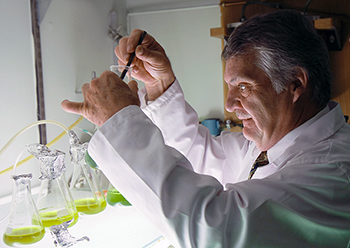German institute invites UFS academic to research on algae to replace fossil fuels

Prof Johan Grobbelaar
Photo: Hannes Pieterse |
Professor Johan Grobbelaar, from the Department of Plant Sciences at the University of the Free State, has been invited by the Institute of Bio- and Geosciences - IBG-2 at Forschungszentrum Jülich GmbH - to do research in Germany from 8 June 2015 to 4 September 2015.
During his research, Prof Grobbelaar will work on the institute’s large-scale outdoor cultivation of green micro-algae with the aim of finding alternate fuels for the aviation industry. This work includes the cultivation of algae in the laboratory, outdoors, and in the greenhouse; the mentoring of local scientists as well as assistance in, and planning of experiments for, green algae cultivation.
Prof Grobbelaar’s research focus is on Algal biotechnology, Limnology, and Photosynthesis. He has authored more than 80 articles in scientific journals, 18 chapters in scientific books, delivered more than 120 papers at scientific meetings, 41 of them at international congresses. Among others, he was honoured with the highest award bestowed on a person by the International Association of Applied Phycologists with the title ‘Distinguished Applied Phycologist’.